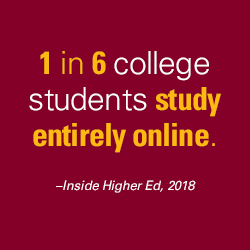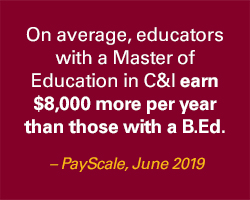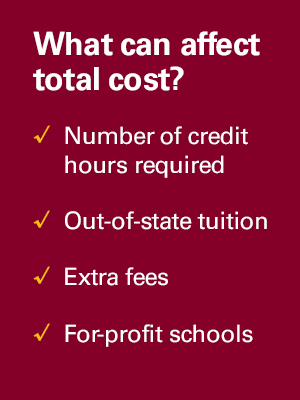Home / Degrees / Education / M.Ed. / Master of Education in Curriculum and Instruction / Top Questions: Master's in Elementary Education Program Online
Top Questions: Master’s in Elementary Education Program Online

A Master of Education in curriculum and instruction offers cutting-edge strategies in educational assessment and design. With an M.Ed. in C&I, you can advance your teaching practice, enhance your current skills and choose from a wealth of degree concentrations, including elementary education.
With a curriculum and instruction degree focused on elementary education, you’ll expand the breadth and depth of your knowledge while focusing on best practices in learning and teaching. You’ll further your classroom skills, boost your career and increase your earning power. You’ll also open the door to doctoral study, or you can pursue advanced professional certifications for opportunities in educational leadership.
If you’re passionate about learning and teaching and you want to remain in the classroom while working toward your graduate degree, choosing an online program is a convenient and affordable option. Follow the links below to learn more about the online M.Ed. in curriculum and instruction with a concentration in elementary education program. You’ll find answers to common questions about distance learning, career options, tuition and financial aid.
What Is a Master’s in Curriculum and Instruction with a Concentration in Elementary Education?

An M.Ed. in curriculum and instruction, or C&I, builds your skills in the planning, implementation and evaluation of instructional methods and curriculum design. Research-based approaches are a key aspect of the degree, as are best practices in teaching and learning. An M.Ed. in C&I often offers several areas of specialization.
A master’s degree in elementary education, including the 100% online option at the University of Louisiana Monroe, is centered on instructional strategies and curriculum design for young learners. From classroom management to community outreach, a C&I degree in elementary education provides the tools you need to effect change in the classroom, organization and community.
After earning a C&I degree in elementary education, you might remain in a classroom setting, or you could work as a curriculum coordinator. Other options include administrator for daycare centers and after-school programs, adjunct faculty member in higher education or community college professor. No matter which path you choose, you’ll know how to help elementary-age children realize their potential. You’ll know how to get them excited about learning.
Are Online Courses the Same as On-Campus Courses?

As long as your university and degree program are properly accredited, it doesn’t matter if you study online or on campus. Accreditation ensures that your courses and your professors meet rigorous academic standards, no matter the format. In fact, a U.S. Department of Education study noted that learning outcomes in online and offline education are the same. As U.S. News & World Report points out, online courses are just as challenging as on-campus courses. In fact, the online delivery method may be more effective for students and instructors in some cases.
Inside Higher Ed reports that one in six students study entirely online. That means more and more employers are accustomed to online grads. In its exploration of online M.Ed. degrees and employer perception, another U.S. News & World Report article finds that employers aren’t concerned by course delivery format. They’re concerned with accreditation. Even so, your diploma doesn’t note how you studied. If your learning outcomes and degree are the same, flexibility is the only real difference between on-campus and online education.
How Are Online M.Ed. Programs Accredited?
Aside from degrees in early childhood education, online M.Ed. programs are accredited by the Council for the Accreditation of Educator Preparation (CAEP) or other accrediting agency. It’s the same accreditation as on-campus programs. If your program or university isn’t accredited, you can’t apply federal financial aid or military benefits to your tuition. Students in unaccredited institutions don’t just struggle to fund tuition or find employment; they also have trouble transferring credits and applying to accredited universities for further study. If you’re considering returning to graduate school for a doctoral degree or principal certification, make sure your M.Ed. is issued by a CAEP-accredited program. Aside from CAEP approval, your university should be accredited as well, preferably by an organization that’s recognized by the Council for Higher Education Accreditation (CHEA).
The University of Louisiana Monroe is regionally accredited by the Southern Association of Colleges and Schools Commission on Colleges (SACSCOC). The M.Ed. in C&I with a concentration in Elementary Education is CAEP-accredited.
What Can I Learn in an Accredited Curriculum and Instruction Program?

An accredited C&I program in elementary education centers on advanced instructional methods for young learners. You’ll master best practices in learning and teaching, analyze and build upon current curriculum standards, and explore the theoretical foundations of curriculum development. The degree further develops your talents as a teacher and classroom manager, and you’ll learn to further support talent development in your students.
Along the way, you’ll gain a deeper understanding of how children learn. You’ll become adept at assessing school cultures and integrating elementary curriculum. Finally, after learning to create and evaluate curriculum and instruction, you’ll also practice the assessment of diagnostic data.
What Courses Do I Need For My Degree in C&I, Elementary Education?
Every university sets its own course list, but you can expect some combination of classes that examine curriculum and instructional theory, foundations of learning and development, educational research, and the assessment of instruction and curriculum. Additional C&I courses in elementary education include lessons in instructional leadership as well as the assessment and improvement of school performance. Many C&I programs also include a hands-on component in the form of an internship, practicum or field experience. This component presents an opportunity to implement your newfound knowledge in a classroom setting.

ULM’s M.Ed. in C&I program, with a concentration in elementary education, consists of 12, three-credit courses. The curriculum is designed to meet eligibility requirements for Louisiana’s Teacher Leader endorsement:
- Teacher Leader I: Educational Research
- Advanced Studies in Elementary Language Arts and Social Studies
- Technology Integration and Portfolio Development
- Expanding Competencies in Classroom Management
- Cognitive Learning: Children and Their World
- Assessment and Accountability
- Prioritizing and Mapping the Curriculum
- Advanced Studies in Math and Science
- Research-Based Instruction
- Educational Techniques for Exceptional Children in General Classrooms
- Teacher Leader II: Improving School Performance
- Internship in Elementary/Early Childhood Education
Is a Master’s in Curriculum and Instruction Worth It?
Whether you’re new to elementary education or a seasoned pro, there are at least four great reasons to consider an M.Ed. in C&I. The first is all about expanding your knowledge and skillset to further your teaching practice.

Setting young children on the path to success is the second reason. You’ll enter the classroom with additional strategies for effective instruction and management, and that can have a lasting impact on learning outcomes.
A third reason? Greater career flexibility and advancement. Whether you choose to stay in the classroom or not, a master’s in curriculum and instruction prepares you for several roles, such as curriculum coordinator or administrator for daycare centers and after-school programs.
The fourth reason is the increased income that comes with career advancement. With a master’s degree in education, you’ll also become eligible to enroll in principal or superintendent certification programs. Even if you choose to stay in the classroom, you are likely to receive a pay bump when you earn a master’s degree, according to the Houston Chronicle.
How Do Online Students Participate in the M.Ed. Internship?
Many online programs with an internship or practicum component will ask you to choose an appropriate site in your community. For graduate degrees in education, that might be a school campus, a child-focused outreach group, or a troop of Girl Scouts or Boy Scouts.
ULM follows the same guidelines. Tasks and projects are embedded in the 8-week internship course. Documentation and written reflections are then submitted as assignments.
Can I Conduct My Internship at My Place of Work?

That depends on your program, but you can probably complete internship tasks on your campus. Some programs may ask you to complete your internship in a new classroom, but others will allow you to work with your own students.
ULM falls into the second, more convenient, category. You can incorporate your internship assignments into your lesson plan for seamless integration.
Which Projects and Activities Will I Complete for My Internship?

With a focus on elementary education and curriculum development, your program may ask you to conduct topical research, revise an existing lesson plan or track learning outcomes.
The elementary education degree at ULM sets itself apart with an emphasis on community outreach and involvement. Learning often extends beyond the classroom, so you might create a project to engage students with local communities. You’ll also gain the opportunity to practice teaching methods for diverse learners, allowing you to address students according to their educational needs.
Are There Jobs Outside of the Classroom for M.Ed. C&I, Elementary Ed Grads?
Yes, and those jobs can pay quite well. Based on an analysis of job postings from June 2018 to May 2019, Burning Glass Technologies found that, in the state of Louisiana, C&I degree holders earn an average of $68,937. That’s well above the state’s living wage of $27,602. Check out the following job options and their median salaries, as listed by the U.S. Bureau of Labor Statistics.
- Daycare Center Administrator/Childcare Center Director: $47,940
- Curriculum Coordinator: $64,450
- After-School Program Administrator: $65,320
- Adjunct Faculty in Higher Education/Community College Professor: $78,470
C&I grads who leave the classroom often go into instructional and curriculum design. Education administration is another option. After all, a master’s degree in education is the first step toward principal certification.
What’s the Average Salary for Educators with a Master’s Degree?

There’s no question that a master’s degree increases your earning power. PayScale data from June 2019 shows that educators with an M.Ed. in C&I earn an average of $55,000 per year. Educators with a bachelor of education in elementary ed, however, earn an average salary of $47,000. That’s a pretty significant pay bump.
While these incomes reflect the national average, salary schedules for teachers and educators are often set by individual school districts.
Do School Districts Pay More for Teachers with a Master’s Degree?

Teacher salaries tend to vary according to experience and performance. Nevertheless, teachers with a master’s degree can still expect a pay raise. Some districts offer a flat raise that persists throughout your career. Caddo Parish, for instance, pays teachers with a master’s degree $2,142 more per year than teachers with a bachelor’s degree. If you plan to stay in the classroom until retirement, that’s an extra $64,260 over a 30-year career.
Instead of a set pay raise, some parishes offer a sliding scale for teachers with master’s degrees. East Baton Rouge takes experience and schedule into account, with changing rates for nine-month teachers, 10-month teachers and 12-month teachers. On the low end, teachers with a master’s degree at East Baton Rouge make about $1,200 more per year than bachelor’s degree teachers. On the high end, that number is $14,628. With that in mind, parish and district salary schedules are publicly available, and many are posted online. If your district isn’t listed below, you can find your potential raise with a simple web search.
- Orleans Parish: $840 more per year
- Acadia Parish: sliding scale of $365 to $1,350 per year
- Lafayette Parish: $1,600 more per year
- Caddo Parish: $2,142 more per year
- Calcasieu Parish: sliding scale of $1,155 to $3,352 more per year
- Bernard Parish: sliding scale of $1,000 to $5,591 per year
- East Baton Rouge Parish: sliding scale of $1,200 to $14,628 more per year
Learn more about our M.Ed. in C&I – Concentration in Early Childhood Education online program!
How Can I Further Increase My Salary After Earning a Master’s Degree?
Professional certifications at the master’s level are available to educators throughout the country. These opportunities are often accompanied by increased earning power. While policies vary, the Education Commission of the States maintains a state-by-state list of leadership and advancement opportunities for teachers. Since policies are often subject to change, always confirm current guidelines with your state board.
For teachers in Louisiana, many parish districts offer an additional pay increase under the Master’s Plus 30 program. As the title suggests, this program applies to teachers with master’s degrees. If you earn an additional 30 credit hours at a regionally accredited university, you’re eligible for another raise. Depending on your courses, those additional hours don’t just lead to higher income; they lead to advanced professional and leadership certifications as well.
What Are the Career Projections for Teachers With an M.Ed. in C&I?
In its assessment of Kindergarten and Elementary School Teacher jobs, the BLS predicts 3% growth nationally between 2018 and 2028, which is slightly below the average rate of growth for all occupations in the U.S. For curriculum coordinators, which fall under the BLS umbrella for master’s-level instructional coordinators, the projected rate of growth over the same period is 6%.
Burning Glass Technologies forecasts a high rate of job growth for graduates with a master’s in curriculum and instruction. Nationwide, positions are set to expand from an actual 3,292,390 in 2014 to a predicted 4,178,755 in 2028.
Employment data between years 2019 and 2028 are projected figures.
What Is the Job Outlook for C&I Graduates in Louisiana?
For a specialized degree, the M.Ed. in curriculum and instruction punches above its weight. Burning Glass Technologies reports that C&I grads capture 7.64% of Louisiana’s labor market. That number is 5.78% nationally.

Elementary school teachers in Louisiana already enjoy one of the highest concentration of jobs in the nation. The BLS, which tracks employment ratios, finds that Louisiana is a close second to Vermont, falling behind by a mere 0.11 on the “employment per thousand jobs” scale. This ratio is especially favorable in Northeast Louisiana and Central Louisiana, which are fourth and fifth in the nation when it comes to job concentration in non-metro areas. Louisiana also does well when it comes to job concentration for curriculum coordinators. In fact, three of the nation’s top five non-metro areas are in Louisiana. If you want to work as a curriculum coordinator, your best bets are Central, Northeast and Southwest Louisiana.
How Do I Compare Tuition for Online C&I Programs?
Weighing tuition against academic reputation will help you determine the relative value of your degree, but first you have to determine your out-of-pocket costs. Calculating expenses for a curriculum and instruction program can be complicated. Start with the price per credit hour, then ask yourself the following questions. You’ll be a tuition expert in no time!

- How many credit hours are required to graduate?
Universities with a low price per credit hour aren’t always the least expensive. That’s because C&I programs can consist of 30 to 54 credit hours. If the former is $500 per credit, the total tuition is $15,000. If the latter is $400 per credit, the tuition is $21,600. Multiply the graduation requirement by the price per credit hour and you’ll have a better sense of your overall cost.
- Is there out-of-state tuition for online students?
Many public universities are state funded, offering subsidized tuition for in-state residents. Out-of-state residents pay the unsubsidized rate, often double or triple the cost. Some schools maintain this practice for online degrees and some don’t. Knowing the difference can save you thousands.
- Are there excessive fees?
Some online programs may charge a distance learning fee, a library use fee or graduation fee, to name just a few. As long as fees are limited and reasonable, that’s fine. If fees are excessive, though, you could end up paying thousands more than the listed tuition price.
- Is the school for-profit or not-for-profit?
For-profit schools are often more expensive than not-for-profit schools. While you might think the added expense comes with a better education, the opposite is true. According to Forbes, for-profit graduates have higher loan default rates, poorer learning outcomes and fewer job prospects than not-for-profit grads.
Is Tuition for a Master’s in Curriculum and Instruction Expensive?
The chart below offers a solid foundation for comparison of elementary education master’s degree programs and their tuition rates:
| University | Degree Program | 100% Online | For-Profit | Price Per Credit Hour | Graduation Requirement | Estimated Tuition |
|---|---|---|---|---|---|---|
| Texas State University | M.Ed. in Elementary Ed | No | No | $1,158 non-resident $743 in-state | 36 credit hours | $41,688 non-res $26,748 in-state |
| Capella University | M.S.E. in C&I | Yes | Yes | $455 | 46 credit hours | $20,930 |
| Strayer University* | M.Ed. in C&I and Assessment | Yes | Yes | $560 | 36 credit hours | $20,160 |
| University of Phoenix | M.A.Ed. in C&I | Yes | Yes | $540 | 35 credit hours | $18,900 |
| Southeastern Louisiana University | M.Ed. in C&I, Elementary Ed | No | No | $523 | 36 credit hours | $18,828 |
| University of Texas, Rio Grande Valley | M.Ed. in C&I, Elementary Math & Science Ed | Yes | No | $458 | 30 credit hours | $13,740 |
| University of Louisiana Monroe | M.Ed. in C&I, Elementary Ed | Yes | No | $300 | 36 credit hours | $10,800 |
Prices taken from university websites
*Additional fees not included in tuition
Am I Eligible for Financial Aid as an Online Grad Student?

If your program and university are accredited, you might be eligible for federal financial aid. You can confirm approved options via the U.S. Department of Education’s Database of Accredited Postsecondary Institutions and Programs. You can confirm personal eligibility requirements with the Department of Education as well. Assuming you’re good to go, fill out the Free Application for Federal Student Aid (FAFSA) on the Federal Student Aid website.
What Should I Do If I Already Have Student Loan Debt?
As a graduate student, you’re still eligible for federal loans as long as your existing debt remains below $138,500. Since federal guidelines are subject to change, you can confirm current limits with the U.S. Department of Education. While you’re not allowed to take on new loans if your old accounts are in default, there are several options for rehabilitating your loans.
If your accounts are in good standing and your balance is under the debt cap, fill out the FAFSA and check out loan deferment. This option allows you to suspend loan payments as long as you’re a part-time student.
Are Online Students Eligible for Scholarships and Loan Forgiveness?

Yes! Grants and scholarships are great choices because they allow you to fund your degree without taking on debt. CollegeBoard and U.S. News & World Report offer reliable portals with a wealth of information for both options. These avenues work for college students in any field, but some grants and scholarships are reserved specifically for teachers. The Fund for Teachers, for instance, offers a design-your-own-fellowship application. The Association of American Educators distributes small grants. If you’re a teacher in Louisiana, you can also apply to the BESE Tuition Program for Teachers, administered by the Louisiana Department of Education.
Loan forgiveness offers another funding opportunity for teachers. If you choose to teach full time in a low-income school or low-income educational service agency for five consecutive years, the Teacher Loan Forgiveness program will erase up to $17,500 of your federal student debt. If you teach for a public school or a nonprofit, you may want to apply for the Public Service Loan Forgiveness program as well. This option cancels your student loan balance after you’ve made 120 on-time payments.
What About Military Education Benefits? Can I Apply Them to an Online Degree?

Just like federal loans, your military education benefits are applicable as long as your program and institution are properly accredited. The Veterans Affairs website maintains a helpful database of approved institutions. Confirming approval is straightforward, but making the most of your education benefits can be complicated. The VA Education and Training Benefits site offers a helpful guide for beneficiaries of the Montgomery GI Bill and Post-9/11 GI Bill. It also has links to manage or transfer your benefits.
Whether you’re an active duty military member, veteran, military spouse or dependent, ULMs Office of Veterans Affairs can guide you through the benefits application process. You can also speak with an enrollment specialist at 800-917-3236.
How Long Does It Take to Complete an Elementary Education Master’s Program?

If you leave your job to study full time in a traditional, on-campus master’s program, it will take about two years to earn your degree. If you don’t leave your job and enroll in an on-campus program part-time, it could take three to four years to reach your goal. An online master’s program with a traditional semester allows you to continue your career as an educator. Depending on your course load, this option will take two or three years. If you prefer a faster path to graduation, an accelerated online program is a better fit. Accelerated programs divide semesters in two, so classes take eight weeks to complete instead of 16. That means you’ll cover the same amount of course material in half the time.
The University of Louisiana Monroe’s online M.Ed. C&I Elementary Education program offers accelerated courses, allowing you to earn your degree in as few as 15 months.
I’m Already Busy with My Own Students. How Can I Earn My Master’s While I Teach?
As a teacher, you already wear a lot of hats. You manage your classroom, track student assignments and grade homework whenever and wherever you can. Earning a degree online is pretty similar. With your already impressive time management skills, you’ll study and complete assignments as needed. That could mean studying over lunch, at night, in the morning or on the weekends. You can even log in to courses from your phone or tablet so you can take care of reading and class discussions wherever the opportunity arises. Balancing your real-world classroom with your online coursework comes with the added benefit of implementing your newfound knowledge right away. That’s great for your learning outcomes, and it’s great for your students.
How Many Hours Do I Need to Study Every Week?

A standard course of three-credit hours will take around nine hours per week, including time for attending class, studying and completing assignments. Accelerated courses take between nine and 12 hours per week, but that’s because you’re covering the same amount of material in half the time. Plan to spend about three of those hours in your online course, completing modules, viewing video lectures and joining class discussions. The rest of the time will be devoted to completing your assignments, studying for exams and reading course materials. And if an assignment calls for implementation in your own classroom, you’ll have a chance to complete some of your studies at work.
How Do Online Courses Work?
Logging into your course is a bit like logging into your social media or bank account. You enter a personalized website and navigate from there. Your university may use Canvas or Blackboard or another Learning Management System (LMS), but the protocol is pretty much the same. Once you access your account, you’ll see a customized course list. Click into the class you want to enter and you’ll find links to discussion boards, video lectures and course modules. You’ll also find a link to course materials, including the syllabus and selected readings. You can download materials and upload your assignments as well. It’s pretty simple. After a few minutes exploring the layout, you’ll know your way around.
If you run into any issues at any point, ULM provides tech support to online students. You can reach the Help Desk at 318-342-3333 or helpdesk@ulm.edu.
Am I Going to Need a New Computer?
You won’t need a new computer if your current machine can reliably:

- Access the internet
- Upload and download files
- Play videos
- Run word processing software
- Run spreadsheet software
- Run presentation software
Don’t worry if your computer is in the shop for a day or two. You can also access the LMS with your phone or tablet.
Which Support Services Are Available to Online Students?
Aside from tech support, many universities provide online students with digital library access. You can log into research databases and check out e-books 24/7.
In addition to these services, online students at ULM are provided with librarian research assistance via Ask a Librarian.
How Do I Communicate With My Professors?
Your professors can be reached through LMS, email and phone. Some professors may opt for text or video chat as well. You can reach out to ask a question or request a virtual meeting anytime.
What Are the Admissions Requirements for a Master’s in Elementary Education?
Every degree program sets its own admissions criteria, but there are a few common requirements. Most M.Ed. in C&I programs will ask for a minimum GPA and a valid teaching certificate. Some programs will also ask for letters of recommendation, GRE standardized test scores (basically the SAT or ACT for grad students), and a minimum amount of classroom teaching experience. While some programs uphold requirements without exception, others take a more holistic approach to allow for conditional admission.
All applicants to ULM’s M.Ed. in C&I are required to hold a valid teacher’s certificate issued by the Louisiana State Department of Education or its equivalent. For the elementary education concentration, your teaching certificate must be in a complementary field. After that, all you need is a minimum cumulative undergraduate GPA of 2.75 from a regionally accredited university, or a minimum 3.0 on the last 60 hours of undergraduate coursework (also from a regionally accredited university). Since ULM allows for conditional admission, the GPA criteria above can be adjusted to 2.5 and 2.75, respectively. If your GPA falls below this threshold, you can still apply with GRE scores.
Do I Have to Wait for the Fall Semester to Enroll?
That depends on your program. A traditional semester schedule might enroll students every fall, but some will accept new students in the fall, spring and summer. Accelerated programs are more flexible. Because they cycle through multiple sessions per semester, there are typically five to six potential enrollment times per year.
ULM’s M.Ed. in curriculum and instruction, elementary education program accepts new students twice in the fall, twice in the spring, and once in the summer. You can check out the course calendar and apply any time.
Learn more about our M.Ed. in C&I – Concentration in Early Childhood Education online program!
Sources:
Salary Schedules:
Acadia Parish Salary ScheduleCaddo Parish Salary Schedule
Calcasieu Parish Salary Schedule
East Baton Rouge Parish Salary Schedule
Lafayette Parish Salary Schedule
Orleans Parish Salary Schedule
St. Bernard Parish Salary Schedule
Association of American Educators
CollegeBoard:
Grants & ScholarshipsCouncil for the Accreditation of Educator Preparation (CAEP)
Council for Higher Education Accreditation (CHEA)
Education Commission of the States: Teacher Leadership and Licensure Advancement
Forbes: For-Profit Colleges' Teachable Moment: 'Terrible Outcomes Are Very Profitable'
Houston Chronicle: How Much Do Teachers With a Master's Degree Make?
Inside Higher Ed: Online Education Ascends
Louisiana Department of Education: BESE Tuition Program for Teachers
PayScale:
Bachelor of Education (BEd), Elementary Education DegreeMaster of Education (MEd), Curriculum & Instruction Degree
Southern Association of Colleges and Schools Commission on Colleges (SACSCOC)
U.S. Bureau of Labor Statistics:
Instructional CoordinatorsKindergarten and Elementary School Teachers
Occupational Employment and Wages, Elementary School Teachers
Occupational Emplyment and Wages, Instructional Coordinators
Occupational Outlook Handbook
Postsecondary Teachers
Preschool and Childcare Center Directors
Social and Community Service Managers
U.S. Department of Education:
Am I Eligible for Deferment?Am I Eligible to Receive Financial Aid?
Database of Accredited Postsecondary Institutions and Programs
Evaluation of Evidence-Based Practices in Online Learning
Free Application for Federal Student Aid (FAFSA)
Getting Out of Default
How Much Can I Borrow?
Public Service Loan Forgiveness
Teacher Loan Forgiveness
U.S. Department of Veterans Affairs:
VA Education and Training BenefitsWEAMS Institution Search
U.S. News & World Report:
7 Myths About Online EducationCollege Scholarships
What Employers Think of Your Online Master's in Education
